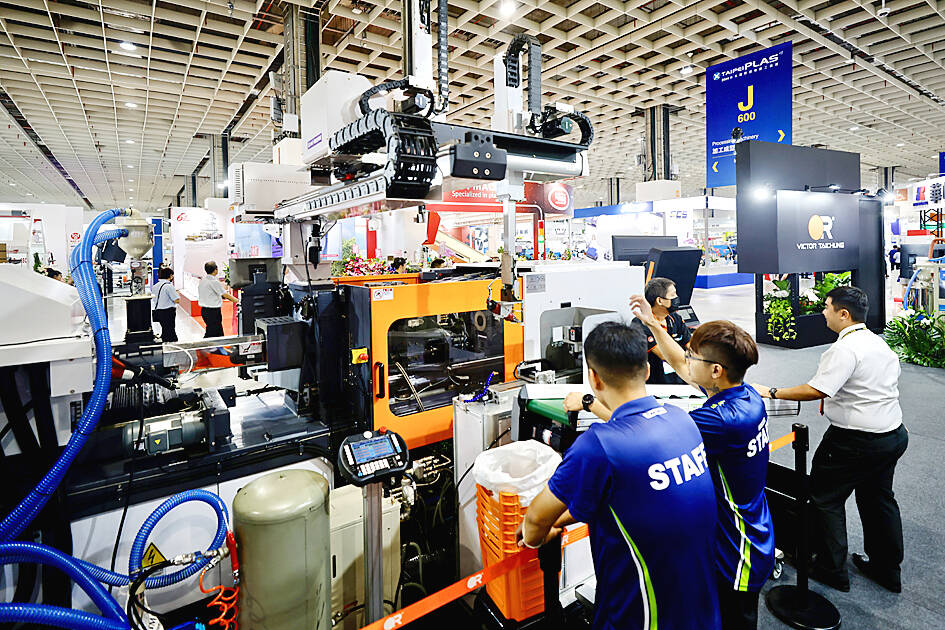Operating conditions for Taiwanese manufacturers fell last month amid lingering economic weakness in the US, Europe and China, the Chung-Hua Institution for Economic Research (CIER, 中華經濟研究院) said yesterday.
The official manufacturing purchasing managers’ index (PMI) shed 4.4 points to 49.2, dropping back into contraction territory, as companies turned from cautious to conservative regarding their business prospects, CIER president Lien Hsien-ming (連賢明) said.
“The subindices on new business orders, industrial production and business outlook all declined into the contraction zone, which could suggest a turning point,” Lien said.

Photo: Ritchie B. Tongo, EPA-EFE
PMI data aim to measure the health of the manufacturing industry. Values of 50 or higher indicating expansion, while values below the threshold suggest contraction.
The sentiment shift had to do with the market’s lack of enthusiasm over global sales of iPhone 16s and a stall in demand for electronics used in artificial intelligence (AI) applications, Lien said.
That explained why the critical subindex on new orders lost 8.2 points to 48.5, while the measure on industrial output tumbled 10.6 points to 46.8, the institute said in its monthly survey.
New export orders sank 8.2 points to 44.6, while unfinished orders dropped 5.9 points to 43.5, the survey showed.
PMI readings already pointed to a slowdown in the US, Europe and China, Lien said, adding that oil exporters last month trimmed their sales forecasts.
CIER researcher Chen Shin-hui (陳馨蕙) said that the absence of a growth catalyst accounted for the lackluster showings, despite the onset of the high season for technology products.
The reading on the six-month business outlook shrank 5.3 points to 47.5, putting an end to seven months of optimism, the survey showed.
CIER vice president Wang Jiann-chyuan (王健全) said that AI is in a bit of a bubble, which would be seen in last month’s shipments.
A Chinese ban on Nvidia Corp chips also would affect local firms in its supply chain, Lien said.
Taiwanese firms would need more time to judge whether rate cuts by the US Federal Reserve and stimulus measures in China would shore up the world’s two largest economies, he said.
Taiwan’s non-manufacturing sectors also experienced a slowdown, but remained at healthy levels, CIER said in a separate survey, as the non-manufacturing index lost 1.2 points to 53.3.
The PMI slowdown weighed on shipping rates and new credit controls by Taiwan’s central bank dampened buying interest at home, CIER said.
However, most service providers are positive about their business going forward, keeping the reading on the six-month outlook at 53.1, it said.

Sweeping policy changes under US Secretary of Health and Human Services Robert F. Kennedy Jr are having a chilling effect on vaccine makers as anti-vaccine rhetoric has turned into concrete changes in inoculation schedules and recommendations, investors and executives said. The administration of US President Donald Trump has in the past year upended vaccine recommendations, with the country last month ending its longstanding guidance that all children receive inoculations against flu, hepatitis A and other diseases. The unprecedented changes have led to diminished vaccine usage, hurt the investment case for some biotechs, and created a drag that would likely dent revenues and

Global semiconductor stocks advanced yesterday, as comments by Nvidia Corp chief executive officer Jensen Huang (黃仁勳) at Davos, Switzerland, helped reinforce investor enthusiasm for artificial intelligence (AI). Samsung Electronics Co gained as much as 5 percent to an all-time high, helping drive South Korea’s benchmark KOSPI above 5,000 for the first time. That came after the Philadelphia Semiconductor Index rose more than 3 percent to a fresh record on Wednesday, with a boost from Nvidia. The gains came amid broad risk-on trade after US President Donald Trump withdrew his threat of tariffs on some European nations over backing for Greenland. Huang further

Macronix International Co (旺宏), the world’s biggest NOR flash memory supplier, yesterday said it would spend NT$22 billion (US$699.1 million) on capacity expansion this year to increase its production of mid-to-low-density memory chips as the world’s major memorychip suppliers are phasing out the market. The company said its planned capital expenditures are about 11 times higher than the NT$1.8 billion it spent on new facilities and equipment last year. A majority of this year’s outlay would be allocated to step up capacity of multi-level cell (MLC) NAND flash memory chips, which are used in embedded multimedia cards (eMMC), a managed

CULPRITS: Factors that affected the slip included falling global crude oil prices, wait-and-see consumer attitudes due to US tariffs and a different Lunar New Year holiday schedule Taiwan’s retail sales ended a nine-year growth streak last year, slipping 0.2 percent from a year earlier as uncertainty over US tariff policies affected demand for durable goods, data released on Friday by the Ministry of Economic Affairs showed. Last year’s retail sales totaled NT$4.84 trillion (US$153.27 billion), down about NT$9.5 billion, or 0.2 percent, from 2024. Despite the decline, the figure was still the second-highest annual sales total on record. Ministry statistics department deputy head Chen Yu-fang (陳玉芳) said sales of cars, motorcycles and related products, which accounted for 17.4 percent of total retail rales last year, fell NT$68.1 billion, or